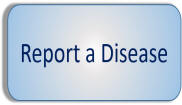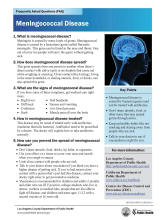Invasive Meningococcal Disease
Invasive meningococcal disease (IMD) is an uncommon but severe infection caused by bacterium
Neisseria meningitidis. IMD most often presents as meningitis or bacteremia. Both are serious and can be deadly in a matter of hours. Prompt diagnosis and treatment of IMD are important due to risk of severe morbidity and death.
People spread meningococcal bacteria to others through respiratory and throat secretions (saliva or spit) during close contact (for example coughing or kissing) or lengthy contact (for example sharing a room). Crowding and mass gatherings have been associated with meningococcal disease outbreaks in the past.
Meningococcal vaccination, recommended for all preteens/teens and persons at increased risk, and post-exposure prophylaxis (PEP) of close contacts are two strategies to help prevent this disease.
Current Situation in Los Angeles County:
IMD cases in Los Angeles County have increased in recent years, after decades of a steady decline, similar to the
national surveillance trend.
Historically, resistance to the antibiotics used for meningococcal treatment and prophylaxis has been uncommon in the United States. However, the number of cases caused by
penicillin- and ciprofloxacin-resistant serogroup Y strains have increased in recent years.
Recommendations for Providers:
Healthcare providers should maintain a heightened index of suspicion for IMD and immediately report all suspected and laboratory confirmed cases to LAC DPH. Suspect cases include those with clinical suspicion of IMD or evidence of gram-negative diplococci on gram stain. LAC DPH will assist with identification of close contacts and provide PEP recommendations to close contacts of the case.
Due to the detection of ciprofloxacin-resistant strains of Neisseria meningitidis in California,
California Department of Public Health no longer recommends the use of ciprofloxacin for post-exposure prophylaxis (PEP) of close contacts of patients with IMD. Rifampin, ceftriaxone or azithromycin are recommended options for
IMD PEP in California (see
table below).
Empiric therapy for suspected IMD remains unchanged and should include an extended-spectrum cephalosporin such as cefotaxime or ceftriaxone.
Additionally, providers are also requested to obtain antimicrobial susceptibility testing (AST) on meningococcal isolates to inform additional changes to meningococcal disease treatment and prophylaxis guidance.
|
Recommended IMD Post-Exposure Prophylaxis Regimen:
|
| Medication |
Age |
Dose |
Duration |
Notes |
| Rifampin |
<1 month |
5 mg/kg, every 12 h, po |
2 days |
Discussion with an expert for infants <1 month
of age.
|
≥1 month
|
10 mg/kg (maximum 600 mg), every 12 h, po
|
2 days |
Can interfere with efficacy of oral contraceptives and some seizure and anticoagulant medications; can stain soft contact lenses.
Not recommended for use in pregnant people.
|
| Adult |
600mg every 12 h, po |
| Ceftriaxone |
<15 years |
125mg, IM |
Single dose |
To decrease pain at injection site, dilute with 1% lidocaine. |
| ≥15 years – Adult |
250mg, IM |
| Azithromycin |
Pediatric |
10mg/kg (maximum 500mg), po |
Single dose |
Equivalent to rifampin for eradication of
N. meningitidis from nasopharynx in one study of young adults. |
| Adult |
500mg, po |
News and Updates
Resources for Providers
Meningococcal Disease: Frequently Asked Questions
English
Spanish
Arabic
Armenian
Farsi
Korean
Chinese
Russian
Tagalog
Vietnamese
Japanese
Additional Information



